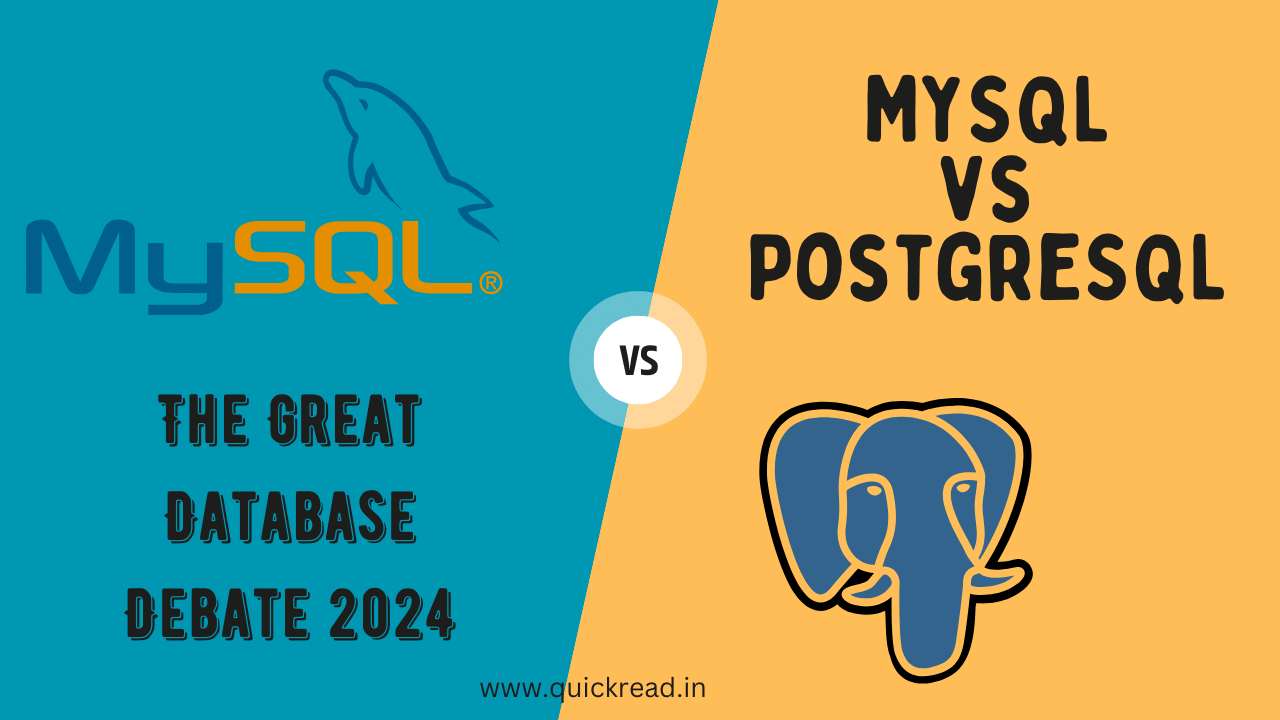Last updated on June 6th, 2024
Introduction
Choosing the right database management system (DBMS) is crucial for any application, as it can significantly impact performance, scalability, and overall success. Two of the most popular open-source relational database management systems are MySQL and PostgreSQL. Both have their strengths and weaknesses, and the best choice depends on your specific needs and use cases. In this comprehensive guide, we will compare MySQL vs PostgreSQL across various dimensions, including performance, features, security, and community support. Whether you’re a developer, database administrator, or IT manager, this article will help you make an informed decision.
MySQL vs PostgreSQL Comparison
1. Overview
MySQL
MySQL is an open-source relational database management system developed by Oracle Corporation. It is known for its speed, reliability, and ease of use. MySQL has been a popular choice for web applications and is the backbone of many well-known platforms such as WordPress, Facebook, and YouTube.
Key Points:
- Developed by Oracle Corporation
- Known for speed and reliability
- Popular in web applications
PostgreSQL
PostgreSQL, often referred to as Postgres, is an advanced open-source relational database management system developed by the PostgreSQL Global Development Group. It is renowned for its robustness, extensibility, and standards compliance. PostgreSQL is widely used in enterprise applications and supports a variety of advanced data types and functions.
Key Points:
- Developed by PostgreSQL Global Development Group
- Known for robustness and extensibility
- Popular in enterprise applications
2. Performance
Performance is a critical factor when choosing a DBMS. It can be influenced by various factors, including query execution speed, indexing, and data retrieval methods.
MySQL Performance
MySQL is designed for speed and performs exceptionally well in read-heavy operations. It uses a storage engine called InnoDB, which supports ACID-compliant transactions and foreign key constraints. MySQL also offers a range of optimization techniques, such as query caching and indexing, to enhance performance.
-- Creating an index in MySQL
CREATE INDEX idx_user_name ON users (name);PostgreSQL Performance
PostgreSQL is known for its performance in write-heavy operations and complex queries. It supports advanced indexing techniques, such as partial indexes and expression indexes, which can significantly improve query performance. Additionally, PostgreSQL’s query planner and optimizer are highly efficient, making it ideal for complex queries and large datasets.
Example:
-- Creating an index in PostgreSQL
CREATE INDEX idx_user_name ON users (name);Key Differences:
- MySQL excels in read-heavy operations.
- PostgreSQL performs better in write-heavy operations and complex queries.
3. Features
Both MySQL and PostgreSQL offer a rich set of features, but they differ in certain areas. Understanding these differences can help you choose the best DBMS for your needs.
MySQL Features
MySQL offers a range of features designed to enhance performance and ease of use. Some of the key features include:
- Replication: Supports master-slave and master-master replication.
- Sharding: Allows horizontal partitioning of data.
- JSON Support: Native support for JSON data types.
- Full-Text Search: Provides full-text indexing and search capabilities.
Example:
-- Using JSON data type in MySQL
CREATE TABLE orders (
id INT AUTO_INCREMENT PRIMARY KEY,
order_data JSON
);PostgreSQL Features
PostgreSQL is renowned for its extensibility and supports a wide range of advanced features, including:
- Data Types: Supports a variety of data types, including JSONB, HSTORE, and arrays.
- Foreign Data Wrappers: Allows querying external databases.
- Procedural Languages: Supports multiple procedural languages like PL/pgSQL, PL/Python, and PL/Perl.
- Full-Text Search: Advanced full-text search capabilities.
Example:
-- Using JSONB data type in PostgreSQL
CREATE TABLE orders (
id SERIAL PRIMARY KEY,
order_data JSONB
);
Key Differences:
- MySQL focuses on performance and simplicity.
- PostgreSQL offers advanced features and extensibility.
4. Security
Security is paramount when dealing with sensitive data. Both MySQL and PostgreSQL provide robust security features, but there are some differences in their approaches.
MySQL Security
MySQL provides a range of security features, including:
- User Authentication: Supports multiple authentication methods.
- Access Control: Fine-grained access control using GRANT and REVOKE statements.
- Encryption: Supports data encryption at rest and in transit.
Example:
-- Granting privileges in MySQL
GRANT SELECT, INSERT ON database_name.* TO 'user'@'localhost';PostgreSQL Security
PostgreSQL is known for its strong security features, which include:
- User Authentication: Supports various authentication methods, including GSSAPI, SSPI, and LDAP.
- Access Control: Advanced access control mechanisms with role-based access control (RBAC).
- Encryption: Comprehensive support for encryption, including Transparent Data Encryption (TDE).
Example:
-- Granting privileges in PostgreSQL
GRANT SELECT, INSERT ON ALL TABLES IN SCHEMA public TO user;Key Differences:
- Both DBMSs offer robust security features.
- PostgreSQL provides more advanced authentication and access control mechanisms.
5. Community Support
Community support is crucial for open-source projects, as it ensures continuous development, bug fixes, and access to resources.
MySQL Community Support
MySQL has a large and active community, backed by Oracle Corporation. There are numerous forums, mailing lists, and third-party resources available for MySQL users. Additionally, Oracle offers commercial support for enterprise users.
Key Points:
- Large and active community
- Extensive documentation and resources
- Commercial support available
PostgreSQL Community Support
PostgreSQL also boasts a strong community, known for its collaboration and contributions. The PostgreSQL Global Development Group actively maintains and develops the database. There are many forums, mailing lists, and user groups dedicated to PostgreSQL.
Key Points:
- Strong and collaborative community
- Comprehensive documentation and resources
- Commercial support through various vendors
Key Differences:
- Both DBMSs have strong communities.
- PostgreSQL’s community is known for its collaborative nature.
6. Use Cases
Understanding the ideal use cases for each DBMS can help you make a more informed decision.
MySQL Use Cases
MySQL is well-suited for:
- Web Applications: Widely used in web applications due to its speed and reliability.
- E-commerce Platforms: Ideal for e-commerce platforms that require fast read operations.
- Content Management Systems: Popular choice for CMSs like WordPress.
PostgreSQL Use Cases
PostgreSQL excels in:
- Enterprise Applications: Preferred for enterprise applications requiring complex queries and transactions.
- Geospatial Applications: Supports PostGIS for geospatial data.
- Data Warehousing: Suitable for data warehousing and business intelligence applications.
Key Differences:
- MySQL is ideal for web applications and e-commerce platforms.
- PostgreSQL is preferred for enterprise applications and data warehousing.
Comparing MySQL and PostgreSQL across various dimensions
| Feature/Aspect | MySQL | PostgreSQL |
|---|---|---|
| Developer | Oracle Corporation | PostgreSQL Global Development Group |
| Initial Release | 1995 | 1996 |
| License | GPL (General Public License) | PostgreSQL License (similar to MIT License) |
| Data Integrity | Supports transactions and foreign keys (InnoDB) | ACID-compliant, strong data integrity |
| Performance | Optimized for read-heavy operations | Excels in write-heavy operations and complex queries |
| Storage Engines | Multiple engines (InnoDB, MyISAM, etc.) | Single storage engine with multiple optimizations |
| Indexing | Standard indexing, full-text search | Advanced indexing (partial, expression indexes), full-text search |
| JSON Support | Native JSON support | Advanced JSONB support with indexing and querying |
| Replication | Master-slave, master-master | Streaming replication, logical replication |
| Sharding | Supported | Supported via extensions (e.g., Citus) |
| Foreign Data Wrappers | Limited support | Extensive support for querying external databases |
| Procedural Languages | SQL, and support for stored procedures and functions | Multiple languages (PL/pgSQL, PL/Python, PL/Perl) |
| Extensions | Limited ecosystem | Rich ecosystem with extensive extensions |
| Security | User authentication, access control, encryption | Advanced authentication, RBAC, encryption |
| Community Support | Large and active, backed by Oracle | Strong, collaborative community, multiple vendors |
| Use Cases | Web applications, e-commerce, CMS | Enterprise applications, data warehousing, geospatial |
| Commercial Support | Available from Oracle | Available from various vendors |
| Documentation | Comprehensive | Comprehensive, with extensive resources |
| Ease of Use | User-friendly, easy to set up and use | Requires some learning curve, but highly flexible |
| Scalability | Good scalability | Excellent scalability, especially with extensions |
| Advanced Features | Basic advanced features | Rich set of advanced features |
Conclusion
Choosing between MySQL and PostgreSQL depends on your specific requirements and use cases. MySQL is known for its speed, reliability, and simplicity, making it a popular choice for web applications and CMSs. On the other hand, PostgreSQL offers advanced features, robustness, and extensibility, making it ideal for enterprise applications and complex queries.
By understanding the strengths and weaknesses of each DBMS, you can make an informed decision that best suits your needs.
FAQs
What are the main differences between MySQL and PostgreSQL?
The main differences between MySQL and PostgreSQL lie in their performance, features, and use cases. MySQL excels in read-heavy operations and is known for its speed and reliability. It is widely used in web applications and content management systems. PostgreSQL, on the other hand, is known for its robustness, extensibility, and advanced features. It performs better in write-heavy operations and complex queries, making it suitable for enterprise applications and data warehousing.
Which DBMS is better for web applications, MySQL or PostgreSQL?
For web applications, MySQL is often the preferred choice due to its speed, reliability, and ease of use. It has been the backbone of many popular web platforms and content management systems. However, PostgreSQL can also be a good choice for web applications that require advanced features and complex queries. Ultimately, the choice depends on the specific requirements of your application.
Is PostgreSQL more secure than MySQL?
Both PostgreSQL and MySQL offer robust security features. PostgreSQL is known for its advanced authentication methods and role-based access control (RBAC). It also provides comprehensive support for encryption, including Transparent Data Encryption (TDE). MySQL offers multiple authentication methods, fine-grained access control, and supports data encryption at rest and in transit. While both DBMSs provide strong security, PostgreSQL is often considered to have more advanced security features.
How do MySQL and PostgreSQL handle JSON data?
Both MySQL and PostgreSQL provide support for JSON data types. MySQL has native support for JSON and offers functions to manipulate JSON data. PostgreSQL goes a step further with its JSONB data type, which stores JSON data in a binary format, allowing for faster processing and indexing. PostgreSQL also provides a rich set of functions and operators for working with JSONB, making it a powerful choice for applications that heavily rely on JSON data.
Can I use both MySQL and PostgreSQL in the same project?
Yes, it is possible to use both MySQL and PostgreSQL in the same project, although it may require additional effort to manage and integrate the two databases. Using both DBMSs can be beneficial if you want to leverage the strengths of each system for different parts of your application. For example, you might use MySQL for read-heavy operations and PostgreSQL for complex queries and transactions. However, managing two databases can increase complexity and maintenance efforts, so it is important to carefully consider the trade-offs.


